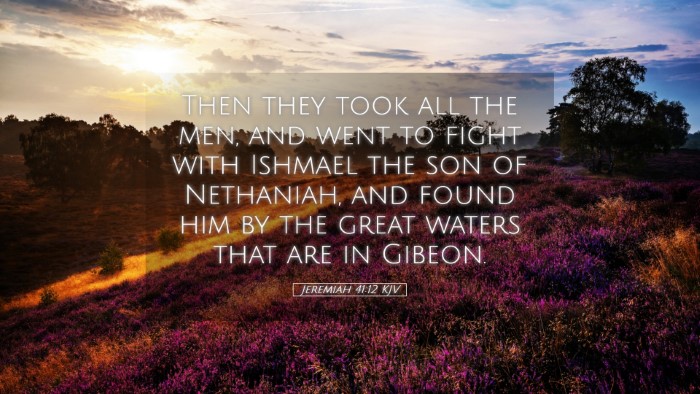Commentary on Jeremiah 41:12
Contextual Overview: The verse Jeremiah 41:12 arises from a turbulent period in Jewish history, following the destruction of Jerusalem. After the fall of the city, the people faced deep despair, fragmentation, and chaos. Jeremiah, as a prophet, conveyed God's messages amidst such turmoil, and his prophecies addressed the nation's sins and their impending judgment.
Verse Analysis
Jeremiah 41:12 reads: “Then they took all the men that were with him, and went to fight against Ishmael the son of Nethaniah: and they found him by the great waters that are in Gibeon.” This verse highlights the theme of conflict among the remnants of the people of Judah as they struggled for survival.
Key Themes
- Leadership Struggles: In the aftermath of Jerusalem's fall, power vacuums emerged. The verse captures the leadership crisis among the Jews, where different factions vied for control.
- Divine Guidance: While the actions of the men may seem driven by an earthly agenda, the overarching narrative indicates God's providence and active involvement even in dire circumstances.
- Judgment and Reckoning: The mention of Ishmael, a figure who represents treachery and violence, underscores the moral decay within the community since he was responsible for the assassination of Gedaliah, the appointed governor.
Commentary Insights
Matthew Henry's Take
Matthew Henry emphasizes the chaotic state of affairs following Gedaliah's assassination. He notes how disunity and discord were rampant among the Jewish people. Henry posits that the actions taken by the “men that were with him” (presumably Johanan and his followers) reflect a desperate attempt to restore order and eliminate the threat posed by Ishmael. He further contextualizes Gibeon, recalling its historical significance and echoing the notion that God’s judgment was intertwined with the nation’s actions.
Albert Barnes' Insights
Barnes provides a more detailed historical perspective, pointing to the geographical significance of Gibeon. He suggests that the “great waters” are indicative of Gibeon’s location, which was well supplied with water and a center for strategic military actions. His commentary stresses the human aspect of these events, illustrating the fervor of the people to reclaim their safety and stability amidst instability. Barnes notes that this episode serves as a pivotal moment in defining the future course of the remaining exiles.
Adam Clarke's Commentary
Clarke approaches this passage by delving deeper into the character of Ishmael, portraying him as a symbol of betrayal and the serious consequences of power struggles. He suggests that the quest to confront Ishmael was not merely a military action but a manifestation of deeper spiritual battles. Clarke underscores the need for unity among the remnants of Judah, asserting that their survival hinges on collective adherence to God’s commandments amid their challenges.
Theological Reflections
Jeremiah 41:12 provides profound insights into the nature of sin, leadership, and community integrity in the face of adversity. The actions depicted illustrate the importance of moral leadership and the dire consequences of personal ambition and betrayal in a broken society. From a theological standpoint, the verse invites reflection on God's sovereignty even in moments of dire human failure.
Lessons for Today
- Importance of Spiritual Leadership: Pastors and leaders must strive to foster unity and integrity within their communities, being mindful of the power dynamics that can arise.
- Valuing God’s Guidance: In times of turmoil, seeking divine direction is imperative. The faithful must turn to prayer and scripture, following the examples set by the prophetic figures in the Old Testament.
- Moral Integrity: The actions and decisions made should reflect not only the need for survival but also a commitment to ethical standards and God’s commandments.
Conclusion
The events that transpired in Jeremiah 41:12 serve as a pivotal reminder of how crucial faithfulness and cooperative spirit are within any community, especially in times of distress. The roles of the individuals involved, their motivations, and their subsequent actions highlight not just a moment in history but an ongoing lesson applicable to all believers seeking to navigate the complexities of life under God’s guidance.


